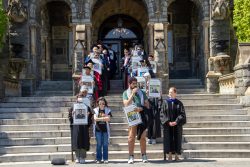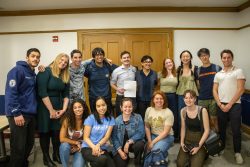In light of concerns from disease experts about the Ebola epidemic, Georgetown hosted a symposium, “The Ebola Crisis: Context, Systemic Challenges, Consequences” on Sept. 23. Panelists—students, professors, and luminaries including President of Liberia Ellen Johnson Sirleaf—gathered to discuss how the crisis is being addressed, and how to lessen the global threat Ebola poses.
“This Ebola outbreak is larger than any outbreaks since the virus was first discovered in the 1970s, and this is the first outbreak to spread rapidly in urban areas,“ said John Monahan, advisor to the President for Global Health and Senior Fellow at the McCourt School of Public Policy.
The virus, which has spread rapidly throughout West Africa, is being regarded as a global crisis with the real possibility of becoming a global pandemic. “I think you can almost describe it as pandemic, pandemic in a sub-region,” said Dr. Scott Taylor, director of the African Studies Program. Taylor noted the quick spread to be a cause of worry and believes that focusing on containment is the most important course of action right now.
In respect to involvement with the crisis, Monahan viewed American action positively. “I believe the international community needs to respond quickly and decisively to meet the challenge,” said Monahan. “I applaud President Obama and the U.S. Government for ramping up the American response to the Ebola outbreak. The U.S. military has unparalleled capacity to stand up and deliver resources, and time is of the essence in addressing this crisis.”
Unlike Monahan, Taylor was a bit more critical of the time it took for the United States to get involved with the crisis. “I think the U.S. is getting in the game a bit late,” he said. “I think the response now is good, but it is about three months late.”
The delay, however, made sense to Dr. James Habyarimana, associate professor at the McCourt School of Public Policy. “We don’t invest in health systems because it is hard to figure out the benefit,” Habyarimana said during the symposium. He hopes that if there is any good thing to come out of this devastating epidemic that a significant change will occur “a call to action for high long-term investment in health systems,” which would benefit health systems in despair—such as Liberia’s. “We have a health care system that’s in stress,” President Sirleaf said. “Most of our health facilities are not functional.”
Regarding the recent attacks and murder of several Ebola workers in Guinea,, Taylor noted that since Guinea has been in an unsettled state since 2008, there is a lack of trust in government, representatives, and health care workers. “[The reaction to aid workers] was in the context of broken political social trust, [and] also in a context where information has not been disseminated, so they thought that those workers were trying to spread Ebola rather than trying to sterilize,” Taylor said. The distrust extends to dangerous extents for patients in other countries as well, “We still see some families that are not ready to turn in their loved ones, even when they see signs of the disease,” said Sirleaf.
“More effective outbreak communication is needed to emphasize key principles such as building trust, transparency, and listening to the concerns of one’s target audience,” said Dr. Daniel Lucey, microbiology and immunology professor at Georgetown. Lucey spoke at the symposium on Tuesday after returning from Freetown, Sierra Leone, where he trained aid workers on how to properly use protective gear and equipment.
“[The symposium] shows the value of forums like this to share information and come to terms with scope, not to lose sight of the fact that this is largely a disease of a particular region at the moment that will hopefully be contained,” said Taylor. “This is not simply an Africa problem.”
The panel’s experts agreed that Ebola is not an immediate threat to the US. “There is little risk or threat to the disease spreading in the US. We have measures for containing it here,” said Ron Walden, professor of Global Health, Department of Global Health George Washington University.
“Unless they have an epidemiological link to persons who have traveled to countries that have Ebola outbreaks or who has had close contact with someone with Ebola virus disease, [Americans are not at risk]” Lucey said.
Monahan suggested that Georgetown students wishing to take action should learn more about the virus and its implications, how it spread, and ways to support public policies. Lucey, who will be returning to West Africa in October to work with Doctors Without Borders to work in Monrovia, Liberia, suggested students support their favorite charitable organization and promoted his own.“[Doctors Without Borders] is an organization that has been involved with the outbreak from the beginning,” said Lucey. “In my opinion, they are a worthy organization to donate unrestricted donations, but there are many others.”




